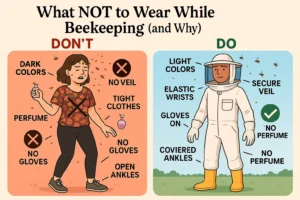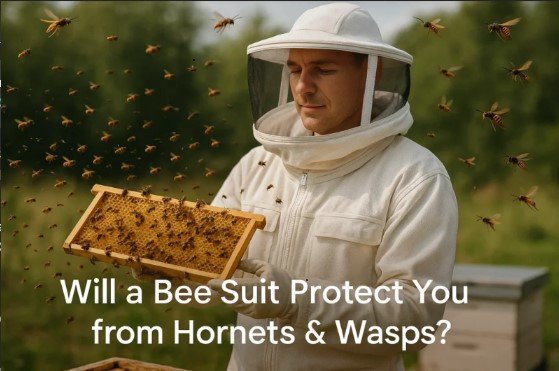
🐝 Gear Up. Stay Safe. Protect the Hive. 🌼

A beekeeper in a triple-layer white suit gently lifts a honeycomb frame from a humming hive. Nearby, a few wasps dart through the air — more aggressive, unpredictable, and armed with multiple stings. But the beekeeper remains focused, confident in the protection their gear provides.
This scene highlights a common concern: Will a bee suit protect from wasps or hornets? Whether you’re an experienced apiarist, a hobbyist gardener, or a professional pest controller, encountering these aggressive insects is inevitable. And knowing how well your suit can defend against them is critical.
In this guide, we’ll answer all the pressing questions:
We’ll also dive deep into the materials, structure, and design of bee suits that determine their effectiveness—and help you choose gear that offers real protection.
Understanding the Threat: Wasps and Hornets vs. Honeybees
To understand how well a bee suit works against stings, it’s essential to know your opponent.
These distinctions matter because wasp and hornet stingers are sharper and more persistent. That means any protective suit must be ready to withstand both pressure and repetition—something not all bee suits are built for.
Will a Bee Suit Protect from Wasps?
Let’s start with the basics: Will a bee suit protect you from wasps? The short answer is yes, but it depends on the quality and design of the suit.
Wasps have:
That’s why standard cotton suits may not be enough. Instead, the safest options include:
Choose a ventilated triple-layer bee suit with heavy-duty construction. It not only keeps you cool but forms a near-impenetrable barrier against wasps—even when they sting repeatedly.
Will a Bee Suit Stop Wasp Stings?
No bee suit is completely sting-proof, but high-quality suits can stop nearly all wasp stings, especially when properly fitted and well-maintained.
Here’s how a bee suit works to stop wasp stings:
Will a bee suit stop wasp stings entirely? Almost always, yes—if it’s a high-quality suit and you avoid skin-tight contact areas.
Will a Bee Suit Work for Hornets?
Hornets raise the stakes. Bigger, faster, and more aggressive than most wasps, hornets are known to:
So, will a bee suit work for hornets? Yes—but only the best suits.
Hornets are capable of finding gaps, so your suit must leave no weak points exposed.
Will a Bee Suit Protect Against Hornets?
Will a bee suit protect against hornets? Yes, if you’re wearing the right type. Lightweight suits or suits meant only for occasional use are not ideal.
Hornet stings are:
A bee suit with triple-layer mesh, full ventilation, and secured joints is your best line of defense. These suits are designed to absorb sting pressure, resist piercing, and prevent hornets from entering through gaps.
GoldenHiveGears suits are engineered with exactly these threats in mind, offering coverage from shoulder to boot and protection even under full swarm attacks.
How Beesuits Handle Aggressive Stingers: Real-World Performance
When professionals or serious hobbyists ask, will a bee suit protect you from hornets or wasps?, they’re often looking for field-tested results.
Will a Bee Suit Protect You from Hornets and Wasps in All Scenarios?
Here’s a helpful breakdown for various situations:
| Situation | Will a Standard Bee Suit Work? | GoldenHiveGears Triple Layer Suit |
| Regular beekeeping | ✅ Yes | ✅ Yes |
| Wasp near hive | ⚠️ Some risk | ✅ Yes |
| Hornet nest nearby | ❌ No | ✅ Yes |
| Wasp attack during harvesting | ⚠️ Depends on quality | ✅ Yes |
| Urban rooftop hives | ⚠️ Depends on environment | ✅ Yes |
| Rural wild swarms | ❌ Avoid without heavy-duty suit | ✅ Yes |
Tips to Maximize Sting Protection
Even the best suit can’t help if used incorrectly. Follow these tips for full sting resistance:
Secure zippers fully and use Velcro or cover flaps. Use gloves with snug cuffs and tuck pants into boots.
Look for tears, seam separation, and veil holes. Replace anything worn or compromised.
Dark colors under light suits can still provoke stings.
Wasps and hornets respond to jerky movements. Stay deliberate and focused.
Smoke can disorient hornets and wasps just like bees. Always carry one.
Final Answer: Will a Bee Suit Work for Wasps and Hornets?
Here’s a complete rundown of the keyword questions:
✅ Will a bee suit protect from wasps?
✅ Will a bee suit protect against wasps?
✅ Will a bee suit stop wasp stings?
✅ Will a bee suit protect against hornets?
✅ Will a bee suit protect from hornets?
✅ Will a bee suit work for wasp?
✅ Will a bee suit protect you from hornets?
✅ Will a bee suit work for hornets?
The answer is clear: Yes, a bee suit will protect you — but only if it’s built for the job. That means multi-layer, ventilated, reinforced, and secure from head to toe.
Why GoldenHiveGears Is the Right Choice
At GoldenHiveGears, our mission is to provide suits that aren’t just made for honeybee work—but are strong enough to withstand hornets, wasps, yellowjackets, and anything else nature sends your way.
Whether you’re managing an apiary, inspecting a wasp nest, or just taking no chances, GoldenHiveGears suits deliver serious peace of mind.
🛒 Explore our premium sting-resistant suits now and face any flight with confidence.
Gear up. Stay safe. Keep beekeeping fearless.
